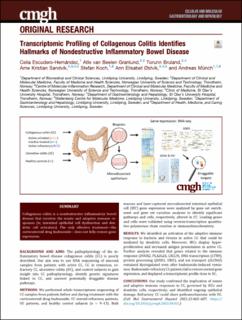| dc.description.abstract | Background and aims: The pathophysiology of the inflammatory bowel disease collagenous colitis (CC) is poorly described. Our aim was to use RNA sequencing of mucosal samples from patients with active CC, CC in remission, refractory CC, ulcerative colitis (UC), and control subjects to gain insight into CC pathophysiology, identify genetic signatures linked to CC, and uncover potentially druggable disease pathways. Methods: We performed whole transcriptome sequencing of CC samples from patients before and during treatment with the corticosteroid drug budesonide, CC steroid-refractory patients, UC patients, and healthy control subjects (n = 9-13). Bulk mucosa and laser-captured microdissected intestinal epithelial cell (IEC) gene expression were analyzed by gene set enrichment and gene set variation analyses to identify significant pathways and cells, respectively, altered in CC. Leading genes and cells were validated using reverse-transcription quantitative polymerase chain reaction or immunohistochemistry. Results: We identified an activation of the adaptive immune response to bacteria and viruses in active CC that could be mediated by dendritic cells. Moreover, IECs display hyperproliferation and increased antigen presentation in active CC. Further analysis revealed that genes related to the immune response (DUOX2, PLA2G2A, CXCL9), DNA transcription (CTR9), protein processing (JOSD1, URI1), and ion transport (SLC9A3) remained dysregulated even after budesonide-induced remission. Budesonide-refractory CC patients fail to restore normal gene expression, and displayed a transcriptomic profile close to UC. Conclusions: Our study confirmed the implication of innate and adaptive immune responses in CC, governed by IECs and dendritic cells, respectively, and identified ongoing epithelial damage. Refractory CC could share pathomechanisms with UC. | en_US |

